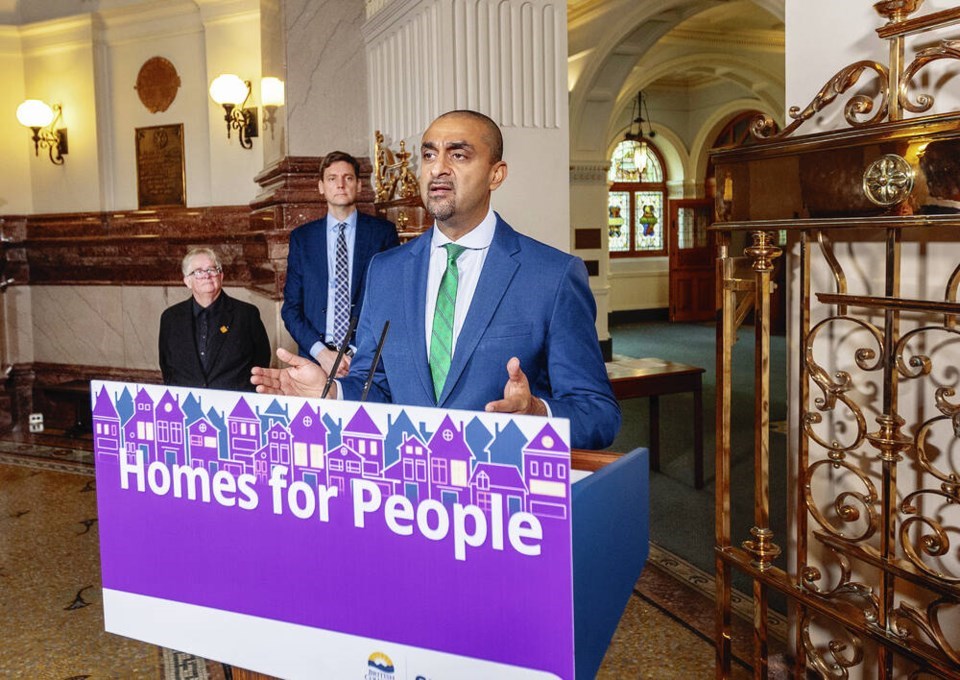British Columbians may have barely begun to digest the massive housing reforms Premier David Eby’s government just passed through the legislature, but the government is getting ready to shift again on the file as the calendar flips to 2024.
Eby will unveil “BC Builds” in early 2024, a multi-billion-dollar provincial housing construction program. It’s perhaps the most ambitious plank yet in an already very ambitious set of housing policies this fall that included restrictions on short-term rentals, multiplexes on single family lots and condo towers at transit hubs.
The exact details of BC Builds have yet to be released. But it’s expected to be a marquee piece of February’s provincial budget. Many details are already known, either through comments the premier and Housing Minister Ravi Kahlon have made publicly, or through Eby’s 2022 leadership bid, in which the idea featured heavily.
“A brand-new housing development initiative to greatly expand government’s role in creating middle-class homes that people can actually afford,” the Eby leadership campaign material proclaimed in September of 2022.
The goal then had been to implement it “immediately,” but BC Builds is so large in scope that it has taken the new premier more than a year to get it ready for launch.
Core to the program was a new inventory of available public land. The province instructed municipalities, Crown corporations, health authorities and other government agencies to review their portfolios and put forward any vacant or underutilized properties. That’s taken months.
“We've got some sites that are parking lots, that are pretty much empty for a long time, we've got some local government sites where they're considering building other amenities, where they're considering a fire hall and now we have the opportunity to build housing on top of that and partner with them,” Kahon told me this week.
“We have some First Nations communities that are coming forward with lands that they have, that they want to find partnerships on. So we're agnostic to who has the land. what we're looking to do is find partnerships where we can get that housing.”
Once it has a property, the government will use its low borrowing rates to help publicly finance construction with a private or not-for-profit developer, said Kahlon.
The government only intends to build in areas where municipal governments agree to fast permitting and maximum density for the housing.
Eby promised in his leadership bid the housing would be earmarked for British Columbians first. That may or may not still be the case.
“We’re still working on all the details around this,” said Kahlon.
It may be a moot point initially, because the first tranche of BC Builds will be geared towards rental buildings and not for-sale apartments, said Kahlon.
“Our focus initially will be focused on rentals, but we will be moving towards allowing and making available home ownership as we go forward,” he said. “That will take some time to develop.”
Eby in his leadership bid envisioned a variety of building ownership structures, such as co-ops, community land trusts and shared equity partnership models.
“Leveraging public land held by the province, we can eliminate the biggest cost in building housing and passing on the savings to the people living in those units,” read the leadership platform.
Some sort of public entity will be driving BC Builds, whether it be by making it a Crown corporation or an arm of BC Housing. Regardless, it will be an influential entity early next year, as the NDP attempts to get at least some construction off the ground, somewhere, before the October provincial election.
“This is going to be a big step forward,” said Kahlon.
“We know that jurisdictions across North America have been considering this. And I believe British Columbia, we are the first ones to actually take it and get it off the ground.”
Rob Shaw has spent more than 15 years covering B.C. politics, now reporting for CHEK News and writing for Glacier Media. He is the co-author of the national bestselling book A Matter of Confidence, host of the weekly podcast Political Capital, and a regular guest on CBC Radio. [email protected]




